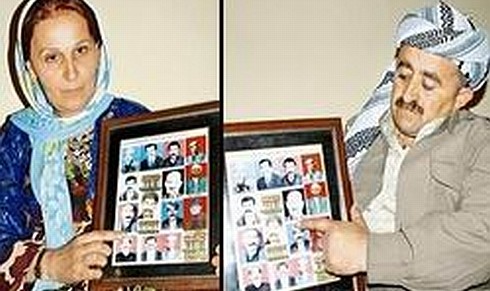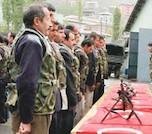
The European Court of Human Rights found Turkey guilty for violating right to life, torture ban, and right to freedom and security in the 1994 Ormancık case on the disappearance of 13 village guards under gendarmerie detention, the killing on 1 villager, and the burning down of a village.
In July 1994 12 village guards from Ormancık hamlet disappeared under gendarmerie detention and two villagers were killed.
On 10 September 2002 family members Meryem Çelik, Zübeyda Uysal, Misrihan Sevli, Emine Çelik, Marya Çelik, Hamit Şengül, Fatma Şengül, Besna Sevli, Hanife İzci, Şakir Öztürk, Kimet Şengül, Hazima Çelik, Şekirnaz İnan and Hamayil İnan filed a lawsuit to ECHR.
The court ordered the Turkish state to pay applicants as sum of 1,460,000 euros as non-pecuniary damages and court expenses.
They got beaten up, killed, dislocated and disappeared
The court verdict cited the events leading to the application as folows:
On 24 July 1994 military and gendarmerie forces arrived in Ormancık. The inhabitants of the hamlet were told by members of the security forces to gather at the helicopter landing pad, which was in the main square. The men of the village were stripped naked and beaten. Two of the applicants, Emine Çelik and Zübeyda Uysal, who were pregnant at the time of the events, were also beaten when they protested against the security forces’ conduct and both eventually suffered miscarriages. Furthermore, Kerem İnan was killed by a non-commissioned gendarmerie officer, a certain F.A., when he did not obey the order to gather in the main square.
The security forces set fire to the houses in the hamlet. Subsequently, Cemal Sevli, Reşit Sevli, Aşur Seçkin, Salih Şengül, Yusuf Çelik, Naci Şengül and Kemal İzci were put in military vehicles by the soldiers to be taken to the military base. On the way to the base, the soldiers stopped two cars in which ten villagers were travelling. The soldiers let the four children in the cars go, but arrested Hayrullah Öztürk, Abdullah İnan, Mirhaç Çelik, Seddik Şengül, Casım Çelik and Hurşit Taşkın. The soldiers then set fire to the villagers’ cars. The gendermerie logs allegedly registered the event as "There were clashes in Ormancık which set the fire in the hamlet". The detained villagers were never seen again.
Life at a refugee camp for 3 years
Between 1994 and 1997, the applicants lived in the Atrush refugee camp, which had been established by the United Nations High Commissioner for Refugees, in northern Iraq. In March 1997, following the closure of the camp by the United Nations, the applicants moved to Suleymaniyeh, a city in northern Iraq. During the autumn of 1997 they finally returned to Turkey and began living in Şemdinli.
In July 1998 a member of parliament, Naim Geylani, requested the Human Rights Commission attached to the Turkish Grand National Assembly (“the Parliamentary Human Rights Commission”) to initiate an investigation into the applicants’ allegations.
Commission: Allegations unfounded!
On 10 February 1999 the chair of the Parliamentary Human Rights Commission, Dr Sema Pişkinsüt, sent a letter to Mr Geylani informing him of the findings in the investigation conducted into the alleged events. She stated that in 1988 a number of people from the Ormancık hamlet of Ortaklar village had become village guards. Some of them, including Casım Çelik, Seddık Şengül, Kerem İnan and Salih Şengül (the relatives of the first, seventh, thirteenth and tenth applicants, respectively), had then made a deal with the PKK that it would not perpetrate acts of violence in the village in exchange for logistical support such as a month’s salary from each village guard, food, shelter and ammunition.
In July 1994 and June 1995 the village guards had helped members of the PKK to ambush security forces - a help that killed 18 Turkish soldiers. Consequently, it was considered that the allegations were unfounded.
“No need for prosecution”
On 6 July 1998, after having read the above-mentioned newspaper article, the Hakkari public prosecutor asked the Şemdinli public prosecutor to open an investigation into the allegations.
In August 1998 and January 1999, Meryem Çelik, Zübeyda Uysal, Misrihan Sevli, Emine Çelik, Fatma Şengül, Besna Sevli, Hanife İzci, Hamayil İnan, Kimet Şengül and Hazima Çelik made statements before the Şemdinli public prosecutor, through interpreters, as they did not speak Turkish.
The Şemdinli public prosecutor also took statements from Lieutenant Colonel A.Ç., who had allegedly been the commanding officer of the soldiers who had gone to Ormancık, as well as from the non-commissioned gendarmerie officer, F.A. They both denied the applicants’ allegations.
On 11 August 1998, upon the request of the Şemdinli public prosecutor, the military forces sent a letter to the public prosecutor’s office stating that soldiers had arrested thirteen villagers and taken them to the Derecik military base. The villagers had been released after questioning. However, Aşur Seçkin had died immediately afterwards as a result of gunshot wounds received from an unknown source while trying to escape to join the PKK.
On 13 April 1999 the Şemdinli public prosecutor drew up a report (fezleke) in which he charges A.Ç. and F.A. with homicide, aggravated theft (gasp), the causing of a miscarriage, the forced evacuation of a village and the burning of vehicles.
On 22 April 1999 the Hakkari public prosecutor declined jurisdiction and sent the file to the Şemdinli District Administrative Council.
On 18 July 2000 the Van Regional Administrative Court upheld the decision not to prosecute A.Ç. and F.A. This decision was not served on the complainants.
On 10 September 2002 Levent Kanat, legal representative, lodged an application with the ECHR after the outcome of the official investigation yielded no results.
Turkey guilty for violating right to life
The court found Turkey guilty for violating right to life, torture ban, and right to freedom and security.
While defendants Meryem Çelik, Zübeyda Uysal, Misrihan Sevli, Emine Çelik, Marya Çelik, Fatma Şengül, Besna Sevli, Hanife İzci, Kimet Şengül, Hazima Çelik and Şekirnaz İnan were each awarded with 125,000 euros as damages, Hamit Şengül and Şakir Öztürk will receive 32,000 euros, and Hamayil İnan 20,000 euros.
The court also ordered Turkey to pay 5,200 for court expenses and fees. (AS/BM)











